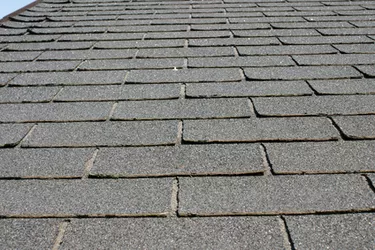
You might be surprised to learn that not all roof types are treated equally by homeowner's insurance. Some are insurable with no problems, but some require additional inspections for underwriting purposes and others are simply uninsurable by some companies. There is no specific list of insurable roof types that applies to all insurers, as each company sets its own underwriting guidelines. Even if you are turned down by one company, you will probably find another willing to insure you If your roof is in good repair.
Asphalt Shingle
Video of the Day
Asphalt shingles are among the most commonly used roofing materials. Shingles are sturdy, safe and durable, ranging in warranty from 25 years to lifetime. There are different kinds of asphalt shingle roofs, such as the traditional three-tab shingles, where each roof piece has three tabs. A newer shingle design is the architectural shingle, which has a more textured appearance since individual shingles are used to create a design, rather than being laid in groups of three.
Video of the Day
Wood
Wood roofs are commonly made of shingles or shake, which is thicker than shingles. Since this type of material is resistant to rotting, it can be a durable choice for roofing material. However, wood is less fire-resistant than other materials, and your insurance company may have additional requirements for your wood roof before writing a policy on it. You might have to treat it with fire retardant, clear a brush zone for a certain perimeter around your home, or pay additional premiums.
Metal
Various types of metal are used for roofing purposes, but the most common are steel and copper. Metal roofs are very durable and fire resistant, making them attractive to insurance companies. The replacement cost for metal roofs can be rather high, however, so check the terms of your policy to see if the insurer is willing to offer replacement cost coverage on this type of roof.
Flat (Bitumen)
For buildings with flat roofs, bitumen roofing is very common. It is essentially several strips of rubber heat-welded on a fiberglass base, creating a single, waterproof roof. These roofs can be textured and colored or left black. These roofs are comparatively inexpensive but last only 10 to 20 years, typically, so your insurance company might require repair or replacement based on the roof's age before issuing a policy.
Commercial Roofs
New roofing materials are being used for commercial buildings all the time, to accommodate the larger roof spaces, greater building movement and increased exposure to weather as compared to typical homes. Metal roofing is popular for commercial spaces for the same reasons it is popular with homes, but various types of plastic roofs, spray-applied polyurethane foam roofs and even roofs made of vegetation are becoming more popular as of 2010. According to Insurance Journal, many insurance companies are still learning how to deal with new commercial roofing technologies in 2010.